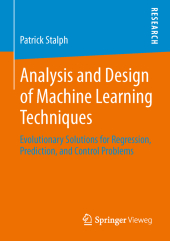 Neuerscheinungen 2014Stand: 2020-02-01 |
Schnellsuche
ISBN/Stichwort/Autor
|
Herderstraße 10
10625 Berlin
Tel.: 030 315 714 16
Fax 030 315 714 14
info@buchspektrum.de |

Patrick Stalph
Analysis and Design of Machine Learning Techniques
Evolutionary Solutions for Regression, Prediction, and Control Problems
2014. 2014. xix, 155 S. 62 SW-Abb. 210 mm
Verlag/Jahr: SPRINGER, BERLIN; SPRINGER FACHMEDIEN WIESBADEN 2014
ISBN: 3-658-04936-7 (3658049367)
Neue ISBN: 978-3-658-04936-2 (9783658049362)
Preis und Lieferzeit: Bitte klicken
Manipulating or grasping objects seems like a trivial task for humans, as these are motor skills of everyday life. Nevertheless, motor skills are not easy to learn for humans and this is also an active research topic in robotics. However, most solutions are optimized for industrial applications and, thus, few are plausible explanations for human learning. The fundamental challenge, that motivates Patrick Stalph, originates from the cognitive science: How do humans learn their motor skills? The author makes a connection between robotics and cognitive sciences by analyzing motor skill learning using implementations that could be found in the human brain - at least to some extent. Therefore three suitable machine learning algorithms are selected - algorithms that are plausible from a cognitive viewpoint and feasible for the roboticist. The power and scalability of those algorithms is evaluated in theoretical simulations and more realistic scenarios with the iCub humanoid robot. Convincing results confirm the applicability of the approach, while the biological plausibility is discussed in retrospect.
Introduction and Motivation.- Introduction to Function Approximation and Regression.- Elementary Features of Local Learning Algorithms.- Algorithmic Description of XCSF.- How and Why XCSF works.- Evolutionary Challenges for XCSF.- Basics of Kinematic Robot Control.- Learning Directional Control of an Anthropomorphic Arm.- Visual Servoing for the iCub.- Summary and Conclusion.
Patrick Stalph was a Ph.D. student at the chair of Cognitive Modeling, which is led by Prof. Butz at the University of Tübingen.


